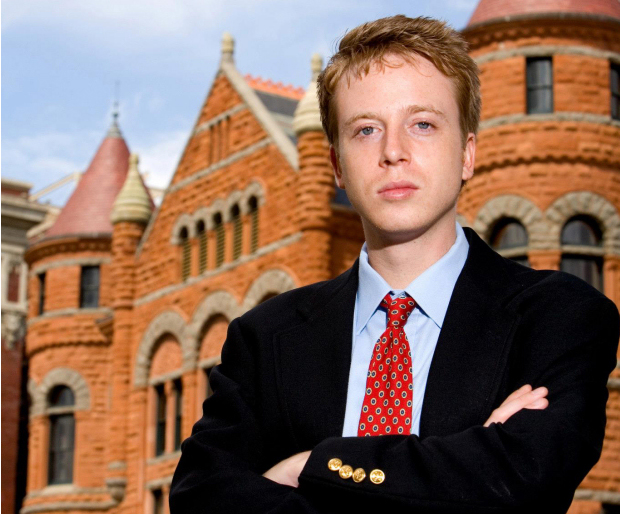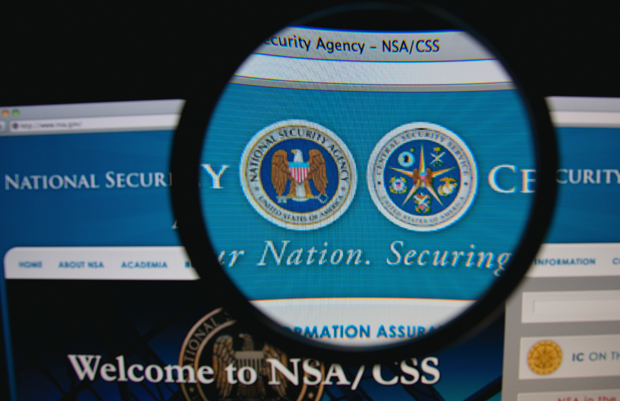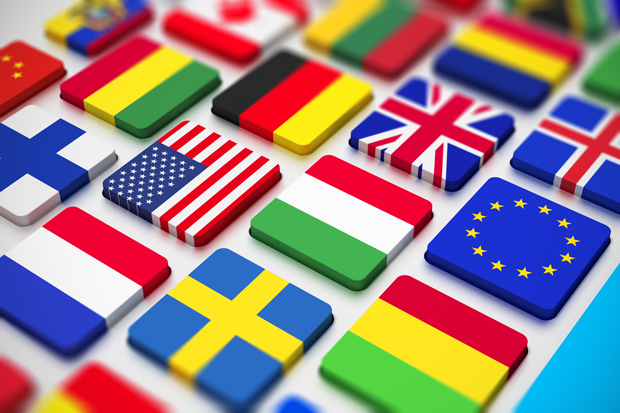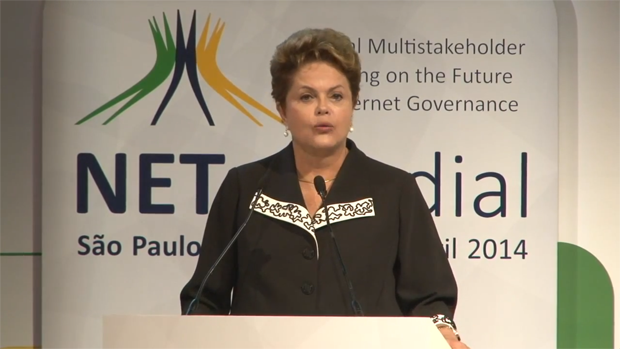9 May 2014 | Digital Freedom, News and features, Politics and Society, United States

(Image: Free Barrett Brown)
Last Tuesday “hacktivist journo” Barrett Brown pled guilty in a US court after a long-running battle with the FBI. He had reported on a high-profile Anonymous hack as well as posting provocative videos on YouTube baiting FBI officials.
At the hearing, the court reduced his sentence from 105 years to eight and a half years, with lawyers saying he could serve far less time.
Both Brown’s defence team and freedom of speech activists are now worried a precedent has been set in which reporters could be prosecuted for writing stories using hacked information.
“The implications are worrisome in the extreme,” said Kevin Gallagher, director of Free Barrett Brown Ltd.
“It must be noted that Brown’s lawyers worked painstakingly to avoid setting an undesirable precedent—one that would place other journalists at risk for dealing with hackers as sources.
“Yet the dangers of this novel legal construction are clear: journalists may be prosecuted for merely speaking to hackers and having knowledge of their breaches.”
Last month US prosecutors dropped 11 of the 17 charges against Brown, who faces three separate indictments. The abandoned claims all related to a breach of private intelligance contractor Stratfor carried out by Anonymous in 2011.
The ringleader of the Anonymous hackers, Jeremy Hammond, was sentenced to 10 years in prison last November.
Brown’s case was criticised by freedom of speech campaigners because it involved him hyperlinking to stolen Stratfor data which had already been made publicly available. Concerns revolved around how one of the core tenets of the internet – link sharing, could be impacted.
“The attempt to criminalize the act of providing links broke new ground in dangerous official absurdity,” said Norman Solomon, an American journalist associated with media watchdog Fairness & Accuracy in Reporting.
No explanation was given by the FBI or prosecutors as to why the charges were suddenly dropped.
Once the gagging order was lifted it was revealed that Brown had in fact advised the Anonymous hackers to redact the data, even contacting the Stratfor CEO to tell him this.
Brown wrote in an email to Anonymous : “It occurred to me that it might be a good idea to tell Stratfor that you guys will consider making any reasonable redactions to emails that might endanger, say, activists living under dictatorships with whom they might have spoken… If they fail to cooperate, it will be on them if any claims are made about this yield endangering anyone”.
According to Gallagher one of Brown’s lawyers commented :”He was very critical of careless releases of data by hackers, but he made efforts to protect his sources; and that’s what he’s being charged for.”
The remaining charges constitute two felonies and one misdemeanour, with one charge of making an internet threat resting on aggressively presented YouTube videos that Brown posted of himself after he grew angry at the FBI’s treatment of his case. One clip was titled “Why I’m Going To Destroy FBI Agent Smith.” A description under the video called for tip-offs about the FBI agent to be sent to a specific email account. Brown pleaded guilty to the charge.
“Barrett expresses deep regret for what he did in making the threat, which he did impulsively at a time when he felt cornered and was unable to make rational decisions,” said one of the lawyers representing Brown, Ahmed Ghappour.
Brown was also prosecuted over obstructing the execution of a search warrant, and being an accessory to unauthorized access of a protected computer. He pleaded guilty to both these charges and will now face up to eight and a half years in prison.
Commenting on the final charge – Norman Solomon also told Index
“Journalists are now facing even more dangerous political terrain in the United States if they want to do real investigative reporting.”
“We should be greatly concerned that U.S. authorities have shown their determination to punish some journalists for putting together pieces of puzzles into coherent pictures.
He added, “In the context of internet journalism, a felony count against linking is akin to legal action against demonstrably thinking in unauthorized ways.”
This article was posted on 9 May 2014 at indexoncensorship.org
7 May 2014 | Digital Freedom, News and features, Politics and Society, United States

(Photo: Shutterstock)
The reforms to the intelligence community that have been advocated by US President Barack Obama are not being taken well in some circles. This is not necessarily because all members of that covert fraternity object to them. There has been, in fact, a general understanding that something had to be done in light of Edward Snowden’s revelations regarding dragnet surveillance. A fundamental feature of Obama’s reform agenda centres on a greater oversight role regarding surveillance applications assessed by the Foreign Intelligence Surveillance Court (FISC).
Former FISC Presiding Judge John Bates has given, in a fashion, support for proposals that would allow the appointment of a public advocate or lawyers acting in an amicus curiae role. Their role suggests, in spirit at least, a modest attempt to open an otherwise secret court process to scrutiny over surveillance applications, providing direction on privacy and specific legal points. “I think it could have some good elements if done correctly,” suggested the judge before a gathering at George Washington University Law School last Friday.
Reading between the lines, however, the judge is not glowing at the prospect of an increased work load, one affected without little benefit. For one, he claims that an outside advocate is, for the most part, needless in standard court deliberations (pen registers, trap-and-trace orders and individualised search warrants) under the Foreign Intelligence Surveillance Act of 1978. Furthermore, surveillance applications tended to be prosaic matters with specific individuals in mind, using such standards as probable cause that would only affect the privacy interests of an individual or set of individuals. Amicus advocates would busy the court without any benefit, they being, for the most part, unqualified to deal with the technical matters at hand.
Where such a “friend” of the court might have some bearing would be on concerns over bulk-collection of data, though the judge was again shaving much relevance over the move. Was this reform a genuine attempt to alter practice, or simply one designed to pacify “public perception”? Those on the FISC are more troubled than pleased.
Many of the concerns made by Judge Bates were outlined in his January 13 letter to Senator Dianne Feinstein, Chair of the Select Committee on Intelligence. It is worth reading carefully, given the role Bates has played as chief judicial officer over FISC matters. A vigorous, conceptual tussle between secret deliberations and transparency is undertaken, much of it fundamental over the role of the court in “oversight” matters.
If workloads were to increase, then this should be “accompanied by a commensurate increase in resources.” Adding a number of administrative subpoena-type cases in excess of 20,000 “would fundamentally transform the nature of the FISC to the detriment of its current responsibilities.” But even such an increase of work would not necessarily be remedied by the mere addition of personnel and resources. It would “prove disruptive to the Courts’ ability to perform their duties, including responsibilities under FISA and the Constitution to ensure that the privacy interests of United States citizens and others are adequately protected.”
Like it or not, Judge Bates suggests that the secrecy function of the FISC should continue. In this, the judge slips into his paternalistic voice, suggesting that publishing Court decisions for public consumption would limit rather than “enhance the public’s understanding of FISA implementation”. Unless classified information is provided with those decisions, confusion was bound to happen.
A real bruiser comes in his detailed observations over what role the public advocate would actually play in FISA proceedings. First and foremost, there will be no constructive adversarial role to speak of, as the advocate will be “unable to communicate with the target or conduct an independent investigation”. Privacy protection will not be assured by involvement of the advocate in “run-of-the-mill FISA matters” and might “undermine the Courts’ ability to receive complete and accurate information on the matters before them.”
Much of the concern stems from who has the authority over appointments. A court appointed advocate might well be more palatable for judges, but it will hardly satisfy the privacy reformists, who wish to open the FISC door to some form of public accountability. But according to Judge Bates, a “standing advocate with independent authority to intervene at will could actually be counterproductive” while a court appointee may well maximise assistance while minimising disruption. He also fears the “constitutional” implications of the move.
Some of Bates’ concerns on the public advocate may be uncalled for. They are already considered in the Leahy/Sensenbrenner and Blumenthal bills. Both make the point that the special advocate only appear in set cases, and never in those touching on individualised search warrants. They would only deal with novel matters affecting subjects of surveillance targeting persons outside the United States (FISA, s. 702) and American subjects under s. 215 of the USA PATRIOT Act.
Judge Bates’ overview suggests that some reforms to the hearing and granting of surveillance applications are not only modest but cosmetic, in so far as they hope to improve privacy protections. The impact will be to actually hamper judicial oversight, rather than improve it. The adversarial element that would improve representation would actually be absent, despite the presence of the public advocate, making the reform one of bluff rather than effect. No change, however, would have been intolerable.
Speaking to a gathering of national security lawyers organised by the American Bar Association, Judge Bates had a prediction. “My guess is nothing will happen legislatively until after the mid-term elections – if then.” There will be congressional disagreements about matters of form and substance. If care is not taken, enacted reforms may well be the bunting without the product.
This article was published on April 7, 2014 at indexoncensorship.org
1 May 2014 | Brazil, Digital Freedom, News and features, Russia, United States

“ICANN’s mission is stewardship and operational stability, not the defence of its existence or the preservation of the status quo.”
Stuart Lynn, ICANN President, Feb 2002
There has been much debate this month among internet circles about the future of the Internet Corporation for Assigned Names and Numbers (ICANN). Much of this was discussed at the NETmundial meeting in Sao Paolo, a suitable venue given Brazil’s desire to throw its weight behind reforming such bodies as ICANN. Reforms are on the cards, but no one seems to be clear what exactly these will do to the way the internet is used. Sentiments of doom and gloom mix with utopian forecasts of freedom.
The NETmundial Multistakeolder Statement doesn’t reveal much, other than paying lip service to various principles (freedom of expression and association, privacy) and charting the roughest of roadmaps for future directions on Internet governance. Aspiration, be it in terms of transparency, accountability and collaboration, is key.
ICANN was incorporated in California on September 18, 1998. Its creation was heralded as a loosening of the grip by US authorities on the operational side of the Internet, tasking a company to take over administrative duties. ICANN plays a leading role in dealing with the distribution of IP addresses and the management of the Domain Name System (DNS).
As far back as February 2002, the organisation’s president, Stuart Lynn, saw the need for reforms of the body. Reforms had to “replace ICANN’s unstable institutional foundations with an effective public-private ownership, rooted in the private sector but with the active backing and participation of national governments.” Tensions of management are fundamental – keeping an eye on “high-level elements of the Internet’s naming and address allocation systems” while avoiding intrusions that would stifle “creativity and innovation”. That tension has never been resolved.
On Mar 14, the National Telecommunications and Information Administration (NTIA), based in the US Department of Commerce, announced that its grip on ICANN would be loosened. “The timing is right to start the transition process,” claimed Assistant Secretary of Commerce for Communications and Information, Lawrence E. Strickling. “We look forward to ICANN convening stakeholders across the global Internet community to craft an appropriate transition plan.”
John M. Eger, Director of the Creative Economy Initiative at San Diego State University, was enthusiastic. “The US Government’s decision to end oversight of [ICANN] represents an opportunity for US leadership creating global ‘e-government’ systems to solve international law enforcement and terrorism problems, develop global education and environmental initiatives, and in turn, start using the Internet as a platform for advancing a new foreign-policy agenda.”
Eger’s overview is counter-intuitive – to shape internet governance, to seize the day, as it were, in such areas, one has to liberalise such bodies as ICANN and lessen the grip. Technology can be better managed and directed if the big holders release the creation. The Internet can become both a tool of open governance if the Obama administration embraces a “multistakeholder model”. “Letting go of ICANN gives the US momentum to more aggressively breathe life into the thousand[sic] of applications, which more truly internationalise its usefulness to nations, and to the world community.”
Eger’s observations are problematic on one direct level. US leadership in such areas has tended towards bullying and cajoling negotiating partners in accepting a supposedly universal premise in implementing its own specific policies. Nothing demonstrates that more acutely than the current secret Trans-Pacific Partnership Agreement talks. Ostensibly geared to accelerate trade liberalisation, the leaked chapters of the document suggest that Washington is keen to impress strict, even draconian intellectual property provisions on potential signatories. What can’t be done through Congress can be smuggled in via international treaty.
The suggested relinquishing of control by the US Department of Commerce has not been deemed a wise gesture on the part of such individuals as Sweden’s minister for foreign affairs, Carl Bildt. In relinquishing such control, internet governance would be altered, allowing other states to throw their hats in the ring. Bildt is convinced that widening such involvement on ICANN is not “the way to go.”
Bildt’s concern is paternalistic. Opening such doors will let in rather unsavoury characters keen on over-regulation. “Net freedom is as fundamental as freedom of information and freedom of speech in our societies.” Despite extolling such virtues, he has proven rather enthusiastic about dousing the flames over the NSA revelations of blanket surveillance, arguing that the Swedish FRA is, in fact, a defender of online freedoms. Visions of governance tend to vary.
Bildt also chairs the Chatham House and Centre for International Governance and Innovation Inquiry, created to examine the Snowden legacy and state censorship of the Internet. In a statement in January, the inquiry partners emphasised that “a number of authoritarian states are waging a campaign to exert greater state control over critical internet resources.” They are far from the only ones.
The short of it is that governments are compulsive meddlers. As attractive as the rhetoric of liberty and freedom might be, intrusive governance is still regarded as acceptable. The Brazilian Minister of Communications, Paulo Bernardo, considers virtual crimes and cybersecurity as vital areas of government policy. He did concede that “protocol standards and domain names registration can be perfectly controlled by the technical community.”
The language of Nikolai Nikiforov, Russian representative at NETmundial, proved more muscular. “Being subject to international laws, states act as grantors of rights and freedoms for citizens, play a role in the economy, security and stability of internet infrastructure, and undertaken measures to prevent, detect and deter illegal actions in the global network.”
Governments, it seems, just can’t let go.
This article was posted on May 1, 2014 at indexoncensorship.org
30 Apr 2014 | Brazil, Digital Freedom, News and features, United States

Brazilian President Dilma Rouseff spoke at the opening of NETmundial.
“In 2013, the revelations about the comprehensive mechanisms for spying and monitoring communications provoked outrage and disgust in broad sectors of the Brazilian and the world’s public opinion. Brazilian citizens, companies, embassies and even the President of the Republic had their communications intercepted. Such facts are unacceptable. They undermine the very nature of the Internet: open, pluralistic and free”.
With these words, President Dilma Rousseff opened the NETmundial – Global Multistakeholder Meeting on the Future of Internet Governance, held in São Paulo on April 23 and 24.
Organized by the Brazilian Internet Steering Committee (CGI.br) and /1Net, the unprecedented gathering brought together 1,229 participants from 97 countries. The meeting included representatives of governments, the private sector, civil society, the technical community and academics. Among those present were the Under Secretary-General of the United Nations, Wu Hongbo; the President of ICANN (Internet Corporation for Assigned Names and Numbers), Fadi Chehade; the “father” of the Web, Tim Berners-Lee, and the co-author of TCP/IP and vice-president of Google, Vint Cerfol. The creator of WikiLeaks, Julian Assange, attended the event via Skype.
The words of the president of Brazil seemed to indicate the tone of the meeting: “This reunion responds to a global desire for change in the current situation, with the systematic strengthening of freedom of expression on the internet and the protection of basic human rights, such as the right to privacy”.
In the audience, activists wore masks with the face of Edward Snowden, whose leaks were a catalyst for NETmundial. They protested against the Article 15 of the Marco Civil–signed into law by Rousseff at the event’s opening ceremony–which orders the retention of users’ browsing data. Some demanded that Brazil offer asylum to Snowden.
The main objective of NETmundial was to begin to formulate a system of international internet governance that will come into effect in September 2015, when the United States steps away from the coordination of ICANN, which administers and manages the names and domains used on the internet.
NetMundial was born thanks U.S. spying that targeted the Brazilian government. Rousseff personally stitched together the event after her speech at the UN General Assembly last year that strongly condemned the NSA spying.
After the meeting, a statement of principles was approved. However, the document does not clearly state any principle governing the massive data espionage or violation of privacy. The term “neutrality” appears only in the list of topics to be discussed in the future. The mass surveillance is identified only as a discrediting factor of the net: “Mass and arbitrary surveillance weakens the trust and the confidence in the internet and in the ecosystem of internet governance”, says the document. The collection and use of personal data “should be subject to international human rights law”. And nothing more. Without incrimination, without any preventive or corrective measure, the question remained open. The postponement of the discussion about net neutrality was advocated by the U.S. private sector.
The final document raised much criticism from civil society, which had their expectations disappointed. With a weak text, the Charter of Principles was more like a set of corporate standards, with little affirmative language, full of marketing buzzwords. Its statements are soft. The governments’ voices, especially the U.S.’s, sounded much stronger. Civil society condemned the lack of explicit rules for the “net neutrality” – the term, by the way, was not even mentioned. Another criticized point was the inclusion of protection and copyright of intellectual property, which meets to the interests of lobbyists from business environment and is contrary to the recommendations of collaborative and free creation.
“The document ended up not reflecting the greatness of the debate that happened here. We missed the chance to produce a substantial document to the discussion of the internet governance”, said Laura Tresca, from the NGO Article 19. “The positive balance is in the process, which was interesting: we experienced the idea of the multistakeholder model in practice; but the final document was too weak.”
EFF published a text that defined the outcome of the meeting as “disappointing”.
The multistakeholder model was criticized by activists as “oppressive, determined by political and market interests”. People like Jérémie Zimmermann (La Quadrature Du Net, which defends the rights and freedom of citizens on the web) and Jacob Appelbaum (developer and security researcher) said that the principles of NetMundial were “empty of content and devoid of real power”. These activists argue that governments have an obligation to ensure the rights of users and that the internet is a common, free and geared to citizens’ good.
It would be very difficult to have unanimity with so many sectors present. Russia, Cuba and India disagreed with the Charter of Principles. Brazil’s minister of communications, Paulo Bernardo, missed a more forceful condemnation of espionage. “For obvious reasons, the United States was uncomfortable with it”, said Bernardo. He recognized that the document is not perfect, but evaluates that it means a victory for the future of governance. The idea now is to enhance the text in other debates, such as the Internet Governance Forum (IGF), that will be held next September in Turkey and in Brazil in 2015.
NETmundial was a historic step putting Brazil in the frontline for internet use in the world, even with the disagreements and a questionable model. Nevertheless, it lacked the courage to allow the voice of the people to sound louder than economic interests. To push the most important issues into the future for further discussions was a mistake – both strategic and purposeful. In this sense, they have bitten more than they could chew.
A previous version of this article referred to Wu Hungbo as the Secretary-General of the United Nations. His correct title is Under Secretary-General of the United Nations. This has now been corrected.
This article was published on April 30, 2014 at indexoncensorship.org




